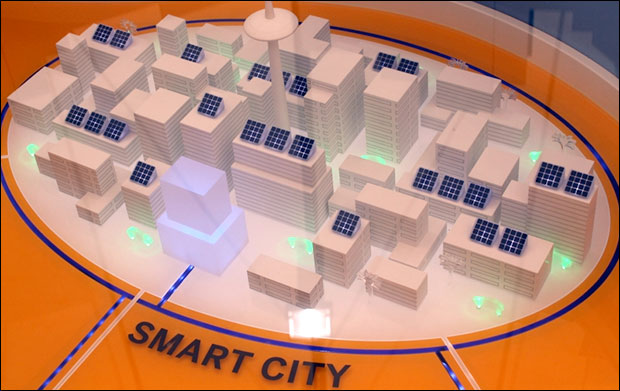Earlier this week, Microsoft announced its “CityNext,” described as a
global initiative intended to develop “smart cities” around the world.
“If CityNext succeeds, cities will improve efficiency by installing
Microsoft products that harness the cloud and big data,” writes Michael Endler for Information Week.
Information Week heralds the prospect of “big data tools and
cloud-powered enterprise apps” empowering workers with “sources ranging
from vast databases to real-time data culled from environmental
sensors,” technologies that “should allow workers to more quickly derive
insights, collaborate with one another and come to decisions.”
So-called “smart cities,” as designed by corporations like IMB and
Cisco, will utilize the “Internet of Things,” or IoT, a system of
objects networked with RFID, the end result being “a world where every
object — from jumbo jets to sewing needles — is linked to the Internet,”
as Helen Duce, the RFID Technology Auto-ID European Center at the University of Cambridge, envisions it.
As an example of the sort of system envisioned, Information World
cites the massive and unprecedented surveillance system built by
Microsoft for the New York Police Department.
Known as the Domain Awareness System, New York’s surveillance
apparatus “takes advantage of the 3,000 closed-circuit TV cameras
currently in place in Lower and Midtown Manhattan, which will soon be
installed in the outer boroughs as well,” according to Stephanie Mlot
of PCMag.com. “It can tap into tools like the NYPD’s recently deployed
radiation sensors and license plate readers as well as crime records,
911 calls, video tape footage, and more to connect the dots on crime.
The new process will help to generate and refine leads, identify
patterns, and optimally deploy manpower, said Police Commissioner
Raymond W. Kelly.”
Mayor Bloomberg, New York’s renowned government nanny, and the NYPD
exploited the attacks of September 11, 2001, to argue for the creation
of their high-tech surveillance system. The NYPD, however, soon began to
use the system for routine police work, a migration undoubtedly
encouraged by its public-private partner, Microsoft.
“Microsoft, as you might recall, has a great and long-standing relationship with government, law enforcement, and even intelligence agencies in the form of helping to fund fusion centers as well as provide fusion center technology,” writes Network World.
The technology magazine quotes Dave Mosher, Microsoft VP in charge of
program management, who admits the transnational tech corporation “is
looking at smaller municipalities, law enforcement agencies and
companies that handle major sporting events.” In other words, the market
for surveillance extends beyond police departments and government
agencies.
The “multi-device ecosystem” proselytized by Microsoft and documented intelligence asset Google
provides an ideal foundation for the sort of all-encompassing and
artificially intelligent surveillance envisioned by the global elite.
Smart cities, smart meters, smart growth — such catchy phrases pushed by
sharp ad campaigns are instrumental to the lingua franca of control.
Increasingly, if we continue to use technology, millions will be
pushed into the “cloud,” a “shared service” and “converged
infrastructure” where we no longer control or even own our own data, but
it is housed on a centralized computer behind a wall emblazoned with
terms of service and contractual stipulations.
This scheme is ideal for control freaks who obsessively collect data
for the sake of formulating social profiles and building mountainous
electronic dossiers, primarily for the art of ferreting out potential
threats to the establishment and the corporatist-fascist status quo.
Nazi Germany’s Gestapo and East German’s Stasi were also obsessed with
this sort of detail-driven data collection, but could at best only
imagine the technological advances utilized by the modern authoritarian
state.
Microsoft peddles its brave new world of gadgets and devices tapping
into big data as representing the “sort of efficiency” that might “not
only save lives during an emergency but also drive day-to-day savings
that total millions, and perhaps even billions, of dollars over time,”
while simultaneously downplaying its work on the sort of massive
surveillance system that will go live in September in Bluffdale, Utah.
Some reports suggest that the new NSA “data center could hold as much as
5 zetabytes, an astronomical sum equivalent to 62 billion stacked
iPhone 5s,” Fox News
reported last month. “According to the NSA, the Utah facility will cost
$1.2B and is the Department of Defense’s largest ongoing construction
project in the continental U.S.”
Microsoft has not acknowledge its role in the NSA’s massive new data
center, preferring instead to push its consumer products and, of course,
its lucrative effort to build surveillance systems for government and
police departments.
The most recent NSA revelations have taught us that large
transnational corporations like Microsoft, Apple, Google, and Facebook
are not adverse to cooperating with the surveillance state and their
efforts are hidden behind facile denials and slick public relations
campaigns.


No comments:
Post a Comment